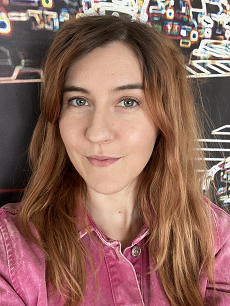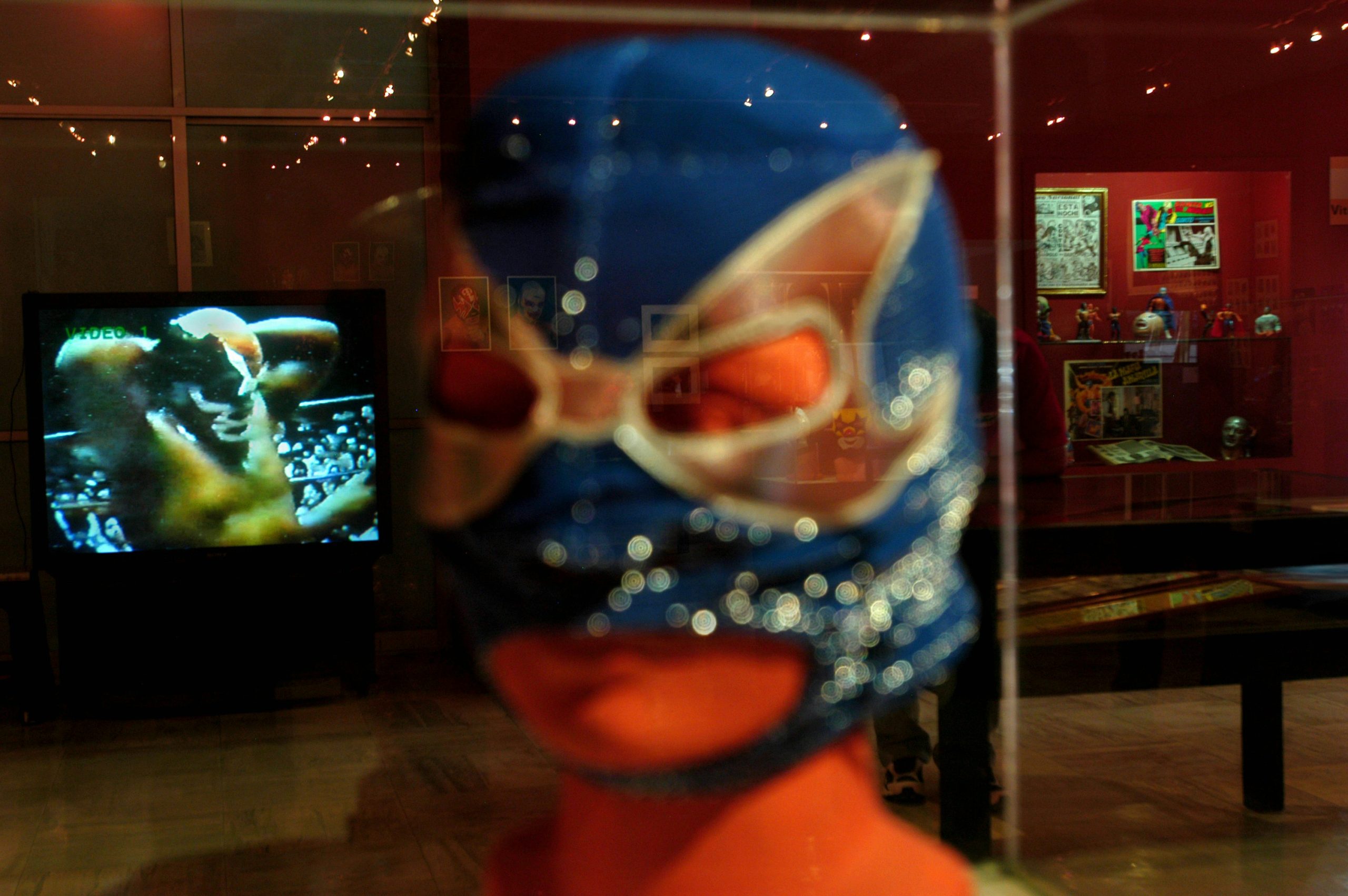What’s the latest thinking on the business of transformation?
It might all have started with the Experience Economy – but the transition to the Transformation Economy is well underway.
So in a special Open Campfire – where 150 participants including WXO Members and non-members joined us – we invited the Experience Economy’s original pioneer, Joe Pine, to share a sneak preview of the follow up to his seminal, best-selling The Experience Economy.
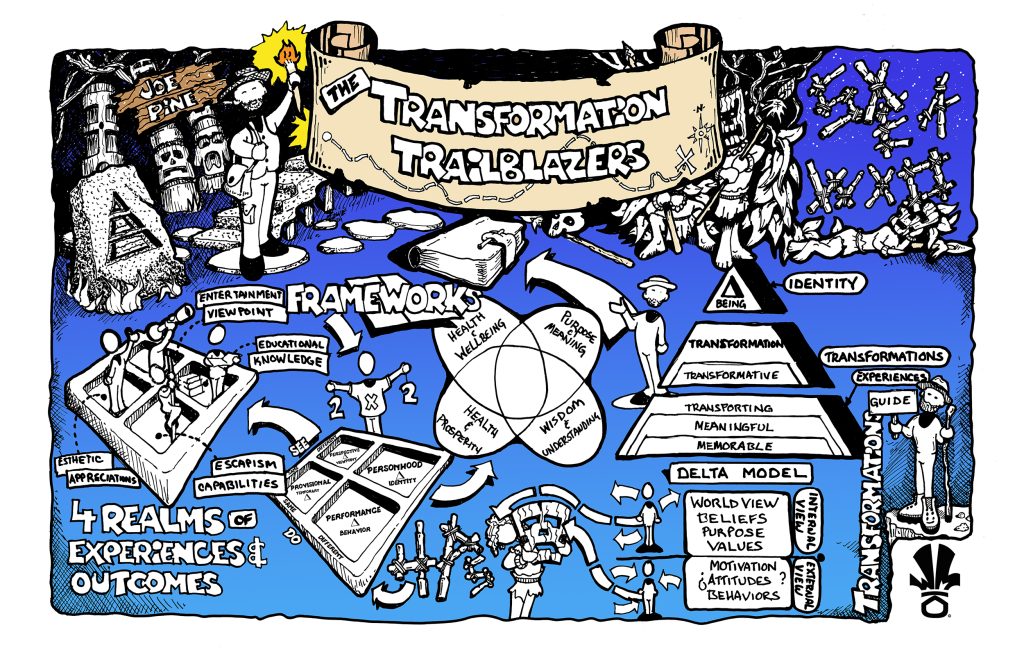
An author, speaker, and management advisor to Fortune 500 companies and entrepreneurial start-ups alike, Pine not only coined the term “Experience Economy”– he wrote the book on it, too.
Now, The Transformations Book – which Pine is currently writing and sharing on Substack – will detail his thinking on the evolution from Experience into Transformation Economy. (Pine will also be leading transformation workshops at this year’s World Experience Summit.)
Read on to discover a snapshot of his live thinking on transformation, including some frameworks in progress, his latest model for transformative experiences, and why human flourishing is at the centre of it all.
The World Is Ready For The Transformation Economy
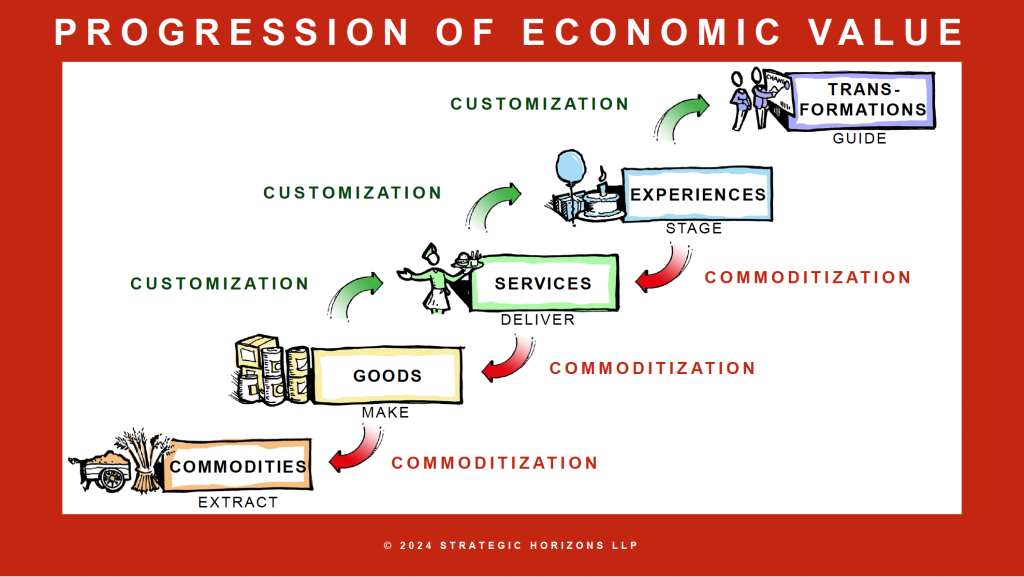
It all began with the publication of the book The Experience Economy, which Pine published with his co-author Jim Gilmore back in 1999. But while it wasn’t namechecked at this time, the Transformation Economy was always present in the progression of economic value set out in the book. Where commoditisation drags you down, customisation lifts you up and turns services into experiences – and experiences into life-changing experiences, or transformations.
“All the stuff about the Experience Economy was a Trojan horse to get people to read about transformations.”
Joe Pine
Since then, Pine has been asked many times about when he’d write the book about transformations, but he felt that the world wasn’t ready, and he didn’t know enough. Now, on the 25th anniversary of The Experience Economy’s publication, he realised that the world is ready to talk about aspiration, which is an opportunity for transformation.
Pine’s work with The Experience Strategy Collaboratives with Stone Mantel, developing experience strategies to create better experiences for customers, now focuses on understanding the aspirations of those customers, and what transformative experiences businesses can create for them to help them achieve these aspirations.
Using Substack as a catalyst to not only get into writing mode, but also to get feedback on his ideas as they developed, Pine began the process of writing The Transformations Book, starting with…
The 4 Spheres Of Transformation: Healthy, Wealthy, Wise, And…
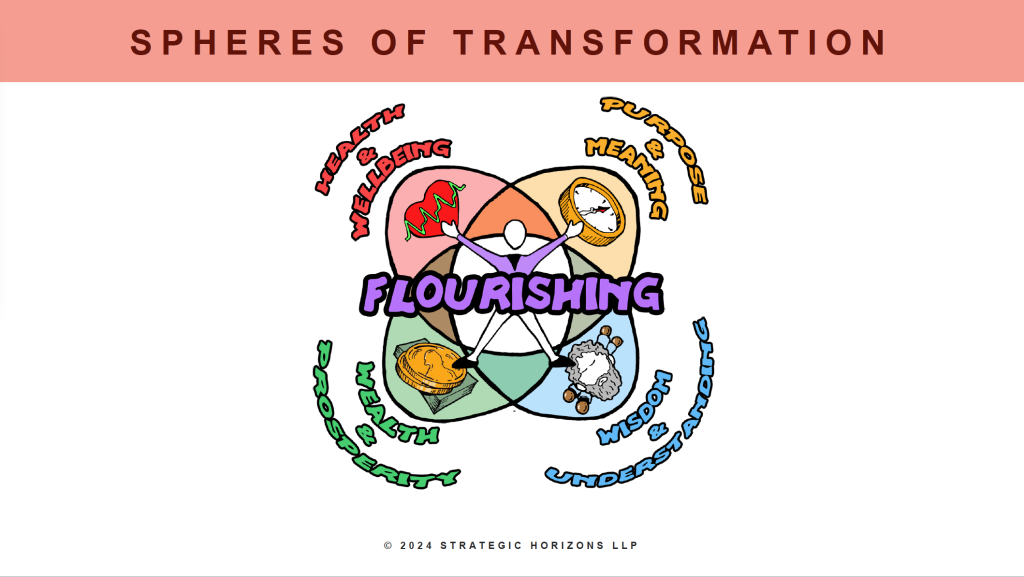
The phrase “healthy, wealthy and wise” originated with Ben Franklin. Any business that helps people to become any of these things is in the transformation business. However, these spheres now expand and intersect beyond this:
- It’s not just about being healthy, but about having health and wellbeing.
- It’s not just about being wealthy, but about having wealth and prosperity.
- It’s not just about being wise, but about having wisdom and understanding.
Pine also adds a fourth element to Franklin’s phrase:
- It’s about having purpose and meaning. This has become especially important over the last few decades – for example, most people want to work for a company that helps us fulfil our own purpose and gives our lives meaning.
All four spheres intersect in the idea of human flourishing. The term “flourish” has gained a lot of currency in economics, but human flourishing is the purpose of any business, at any level of the progression of economic value. For more, see the brilliant book Flourish by Martin Seligman, the founder of positive psychology.
“The transformation economy is most about the fulfilment of economic value: you transform people so they can flourish.”
Joe Pine
Types Of Transformative Experiences
Pine played with two different frameworks for types of transformative experiences in the effort to discover which was best.
- Epistemic Quality & Type of Change
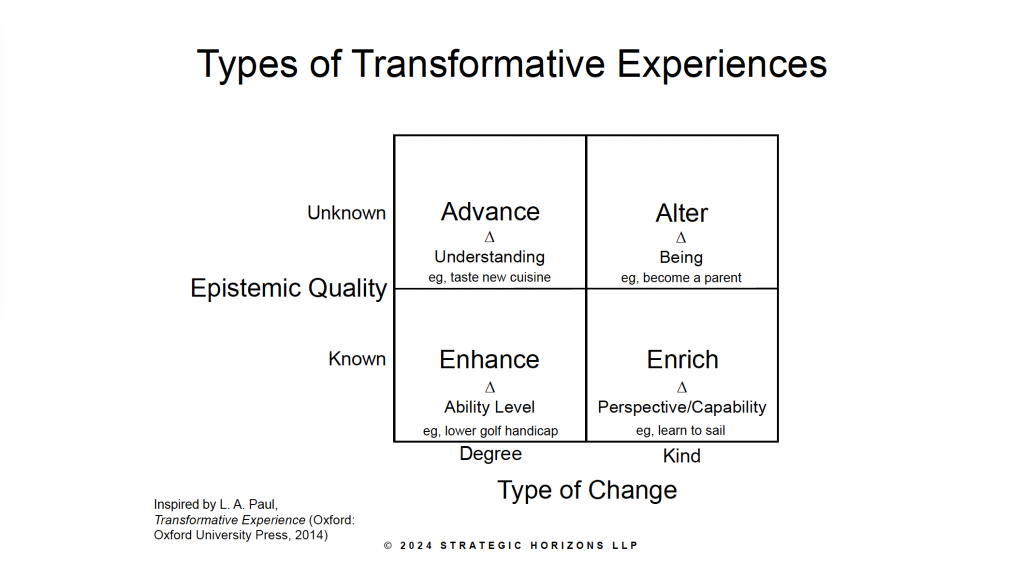
Inspired by Lesley Paul’s book Transformative Experience, this framework is based on “epistemic quality”: the values and the knowledge you possess. Paul believes transformation only occurs in the “Alter” quarter, where you can’t see beforehand what you’ll be like after you make the transformation. While there is value in all types of transformations, this total transformation is best – like becoming a parent (or a vampire!).
- See & Do
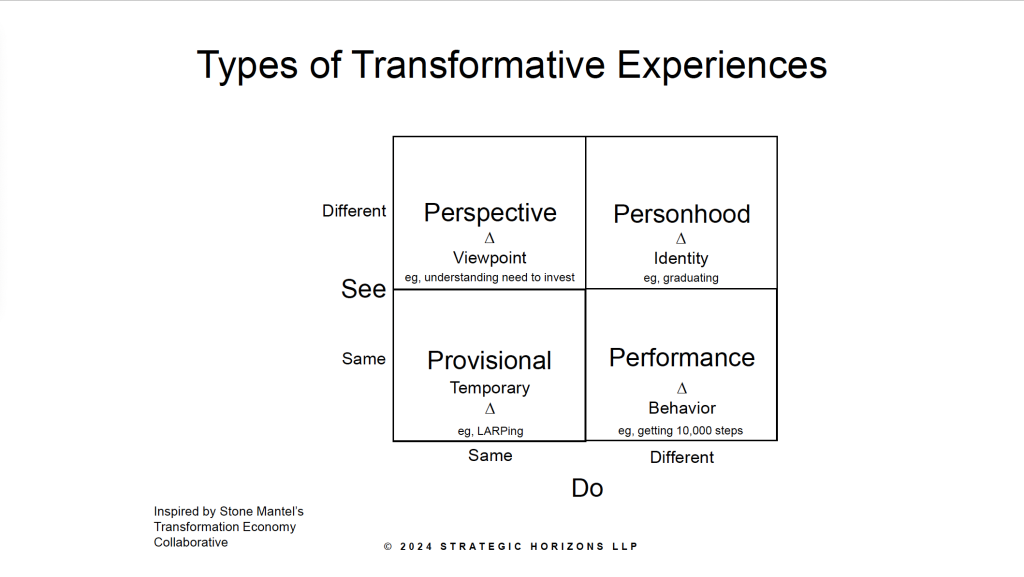
Inspired by research with Stone Mantel’s Transformation Economy Collaborative, this framework is based on the idea that people want to see and do differently. When both your perspective and your behaviour change, you end up in the Personhood quarter, where your entire identity shifts.
The Provisional quarter is also interesting, as if a transformation doesn’t last, does it really count? These type of temporal transformations that change you, but only for a time, could be described as “transportive”.
Wendy Heimann-Nunes uses the example of a trip to Brazil, where she was transported, and a lot of transformational travel and awe fall under this. It isn’t until you integrate the transformation into your daily life that it becomes a true transformation.
The Delta Model For Transformative Experiences
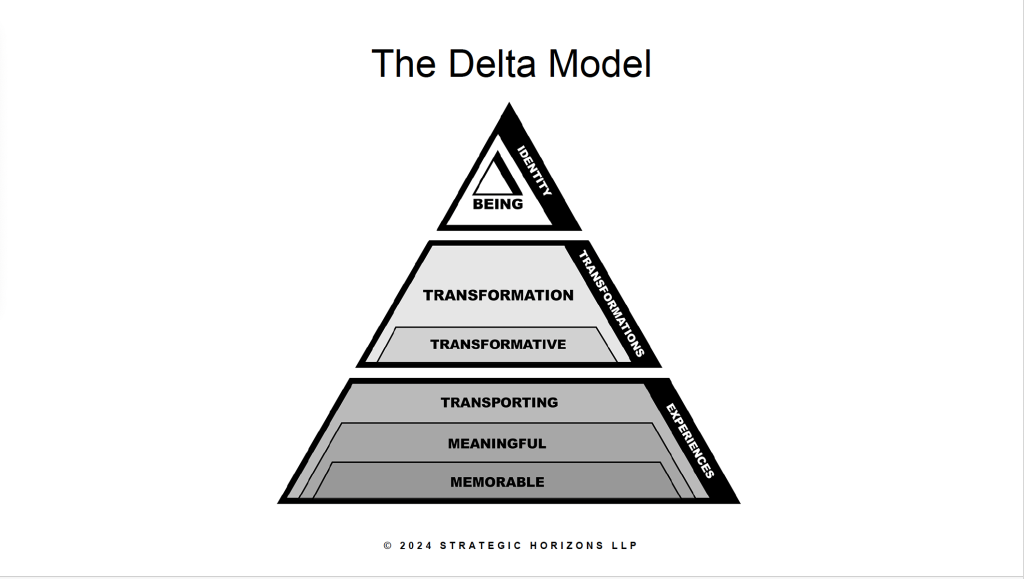
Pine asked his Substack subscribers which framework they preferred. Less than half said both and a quarter said neither, so he went back to thinking, along with collaborator Kevin Dulle. His next thought arrived in a flash of insight in church, and he called it the Delta Model.
Delta is the universal symbol for change in Green mathematics, and Pine’s model looks to combine the best of the two previous frameworks.
- At the bottom “experience” level of the pyramid sit experiences that are memorable, meaningful and transporting (in that order). Meaningful experiences go beyond the memorable and can relate to our meaning and purpose, but they aren’t the same.
- At the middle “transformations” level sit experiences that are transformative or a transformation. A transformative experience is part of a transformation, but a transformation is generally made up of multiple transformative experiences.
- And at the top “identity” level sit experiences that alter our entire identity and sense of being.
Experiences at the bottom of the period are more numerous than those at the top – and those at the top include all of those below.
When it comes to identity change, these factors indicate a change within oneself:
- Worldview
- Beliefs
- Purpose
- Values
And these factors indicate an observable change:
- Motivations
- Attitudes
- Behaviours
The WXO Take-Out
Having been a key voice in establishing the 4th industrial revolution towards experientialism and the Experience Economy, Pine’s work continues to set the stage for how we think about transformation, make sense of it for people, and create a better world.
His Delta Model reminds us of Mat Duerden’s Hierarchy of Experiences, George Akerlof’s Identity Economics, and Mike Monello’s skimmers, swimmers and divers metaphor for understanding experience consumers, but in reverse.
It also provides a better understanding of the value we provide to consumers in the new Transformation Economy as we help them realise their aspirations.
So next time you’re designing an experience, ask yourself:
- Are you in the experience business or the transformation business?
- What transformation(s) do you design for?
- How do you currently provide a path to transformation(s) for your audience?
Enjoyed this? You might find these articles interesting:
- The Hierarchy Of Experiences
- How To Design For Transformation With Joe Pine
- All The World’s A Stage: How To Design Transformative Learning Experiences
- Is There A Timeframe For Transformation?
- How To Create Indelible Memories and Transformation Through Immersive Experiences
- How To Design Experiences For Fans & Superfans
Want to come to live Campfires and join fellow expert experience creators from 39+ different countries as we lead the Experience Revolution forward? Find out how – and the current speaker line-up – here.


